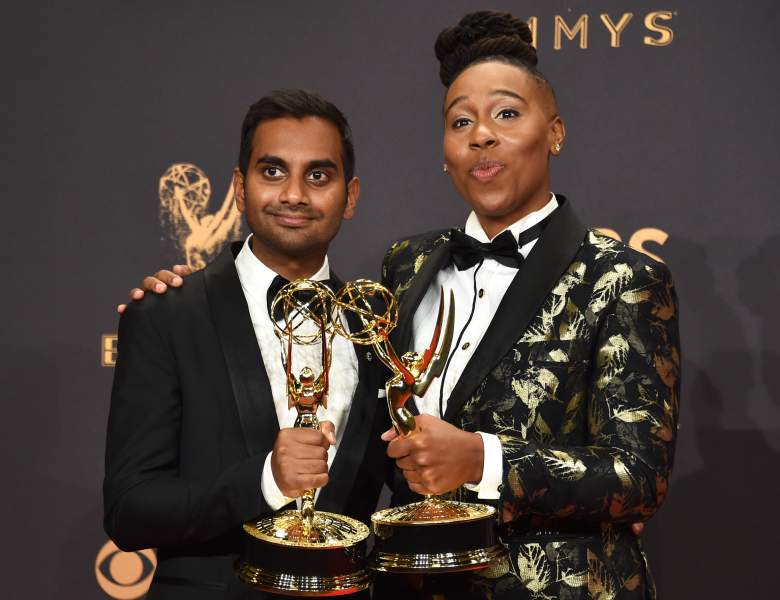
Alberto E. Rodriguez/Getty Images Waithe and Ansari pose with their Emmys in 2017 having won for Outstanding Writing for a Comedy Series.
In the wake of the coronavirus pandemic, many creatives have become even more creative.
Take inventor, Vincent Peters for example. His Inheritance AI is focused on preserving the human experience and enabling the individual human experiences to persist indefinitely.
The company seems to be tapping into HBO’s hit show, Westworld which stars Lena Waithe and depicts how folks live out their fantasies through artificial consciousness.
According to their website, Inhertiance AI plans to provide multi-perspective legacy preservation services for individuals serious about building a long lasting and dynamic legacy.
With the backing of board members like Chelsea Grayson, a former CEO of True Religion and American Apparel, Mike Parra CEO DHL Americas and celebrity attorney and Harvard Law School Alum and restaurateur Walter Mosely, the company plans to begin work in 2020 on building its first fully autonomous copy of a person.
The first subject will be a well known individual and the process will be documented for the world to see.
That’s quite interesting.
Could you imagine another John F. Kennedy, Kobe Bryant, Albert Einstein, Martin Luther King, George Washington or Michael Jordan?
I contacted Vincent Peters to discusss the makeup of the company and the company’s plans.
Check out our Q&A below:
Brandon ‘Scoop B’ Robinson: What is the process in actually extracting memories?
Vincent Peters: The process includes the baselining of a human being which we will refer to as subject. In order for us to make high fidelity digital backups or copies of a subject it requires that we appropriately capture the subject’s knowledge base. The knowledge base in the most simple form can be thought of : who is the subject to themself, who is the subject to others, and what did the subject do in his / her / their life. The subject will work with our team to curate and capture the story of their life. During the curation process we will conduct video interviews, begin to understand and digitally replicate the subject’s decision logic and study how our subjects talk and interact while speaking and listening. In the end we hope to produce a high fidelity digital replication of a subject that recognizes family and friends and is able to have conversations with these family and friends the same way that the subject would be able to.
Brandon ‘Scoop B’ Robinson: What made you decide that this is necessary?
Vincent Peters: The service that inheritance AI provides is necessary to stop the invaluable loss of knowledge that occurs every time someone dies. We as humans are and have been experiencing massive data lost for the past 200,000 years. inheritance allows humans to stop this data loss and to widen the aperture of what is documented about a subject and allows this documentation/remembrance to be shared with future generations.
Brandon ‘Scoop B’ Robinson: On your Instagram, you have Kobe Bryant as an example. How could this service have helped the Black Mamba?
Vincent Peters: The picture on my Instagram is capturing the data loss of Kobe passing. If Kobe would have gone through the inheritance process upon his untimely passing his family, friends and fans could spin up the digital backup of Kobe and interact with a digital being that looks, thinks, speaks and is the essence of Kobe. This in no way replaces the real Kobe, but in 15 – 20 years from now how will Kobe be remembered? Until The Last Dance aired most young people only knew Michael Jordan for the crying meme. Having a digital backup of yourself with inheritance allows individuals to have an active voice in their legacies and how they are remembered.
Brandon ‘Scoop B’ Robinson: When you look at a service like this, it makes me think about how women are storing their eggs. How does something like what you are doing compare to this process?
Vincent Peters: The way this process is similar is that just how scientists figured out how to preserve a woman’s egg, humans will also figure out how to harvest, grow or 3d print organic human bodies. In that future inheritance will provide the intelligence required for these new bodies. In one of our use cases we present the concept that a subject dies in 2030, but is fully digitally backed up. In 2150 humanity perfects the process to 3d printing organic bodies. We take the organic 3d body fuse it with the backup of the subject in 2030. I won’t go into more detail than that but you can begin to see the possibilities.
Brandon ‘Scoop B’ Robinson: The price points for your service may be a deterrent. Why is this such a great investment?
Vincent Peters: $500,000 for a partial autonomous AI backup and $1M for a fully autonomous AI backup are not trivial prices. The intent is that as we improve our capture process, technology and understanding of how to better create high fidelity backups of a subject these price points will come down significantly. One of the models we are building now is a backup of myself and we have already identified value add partners who are helping us to reduce the cost of development.